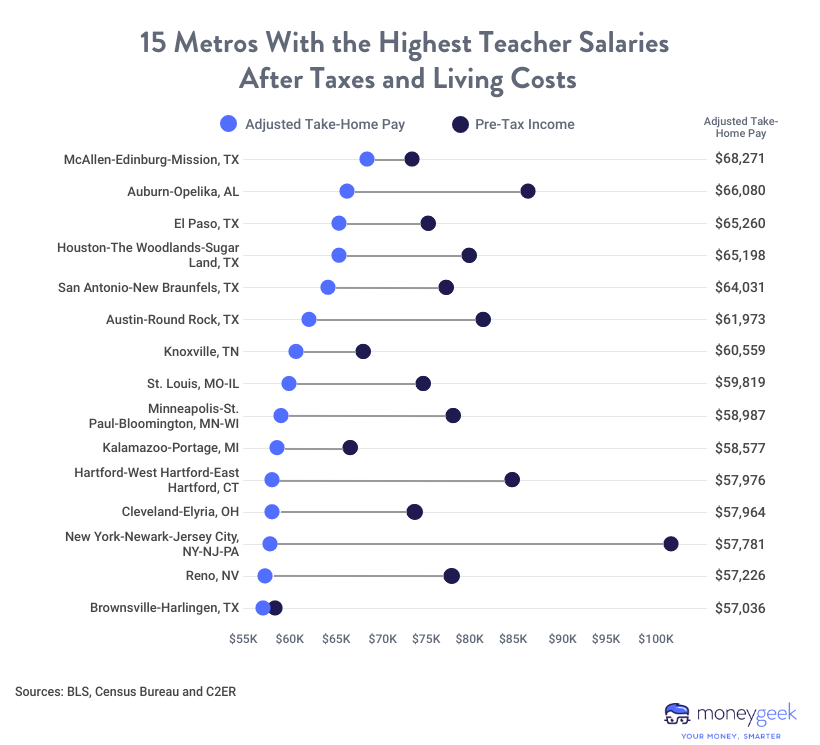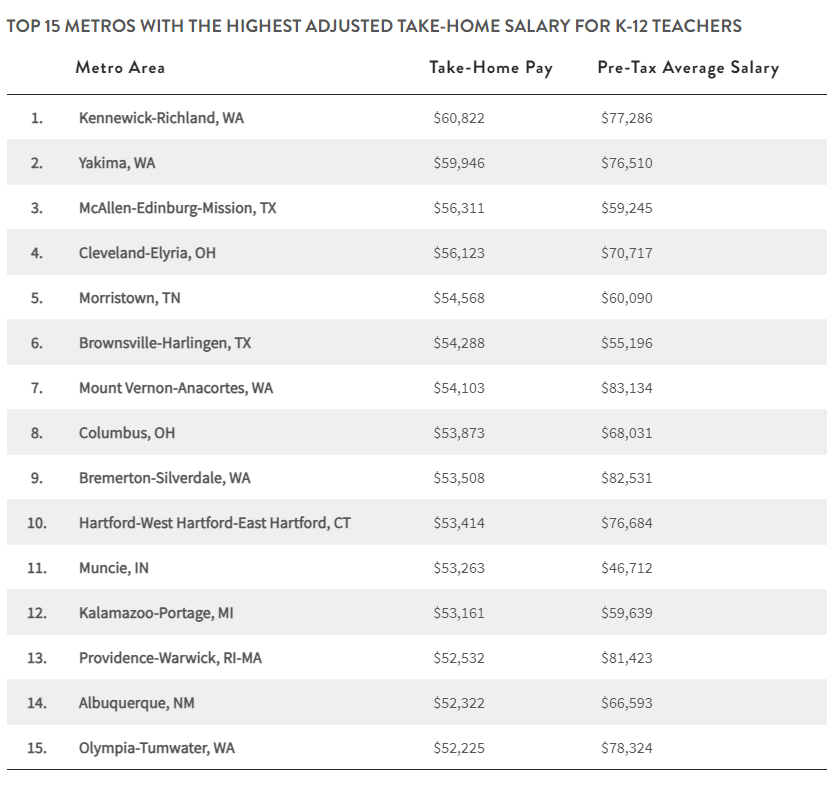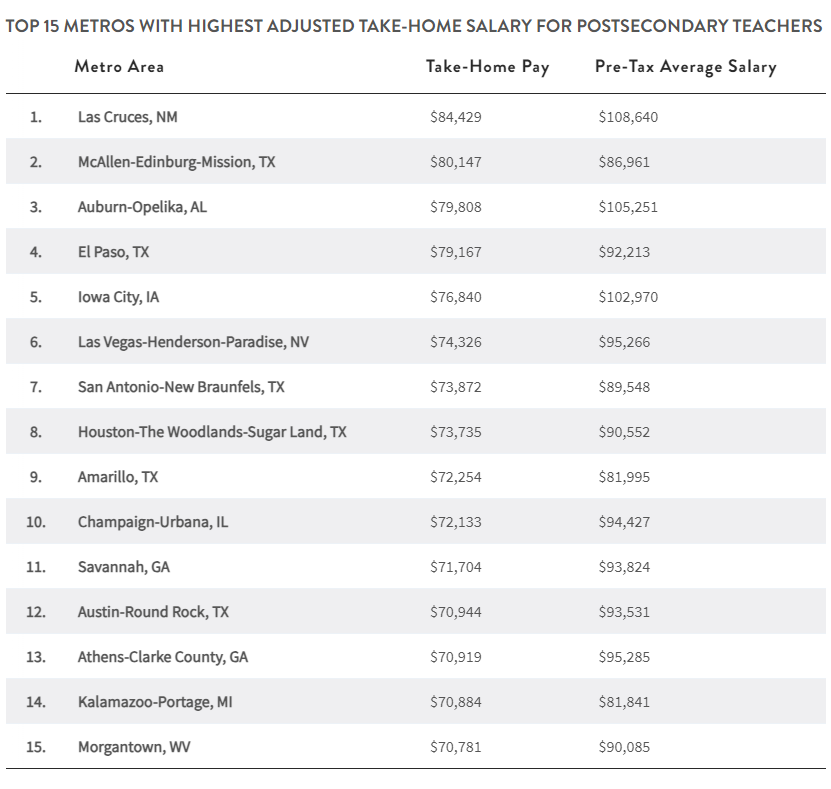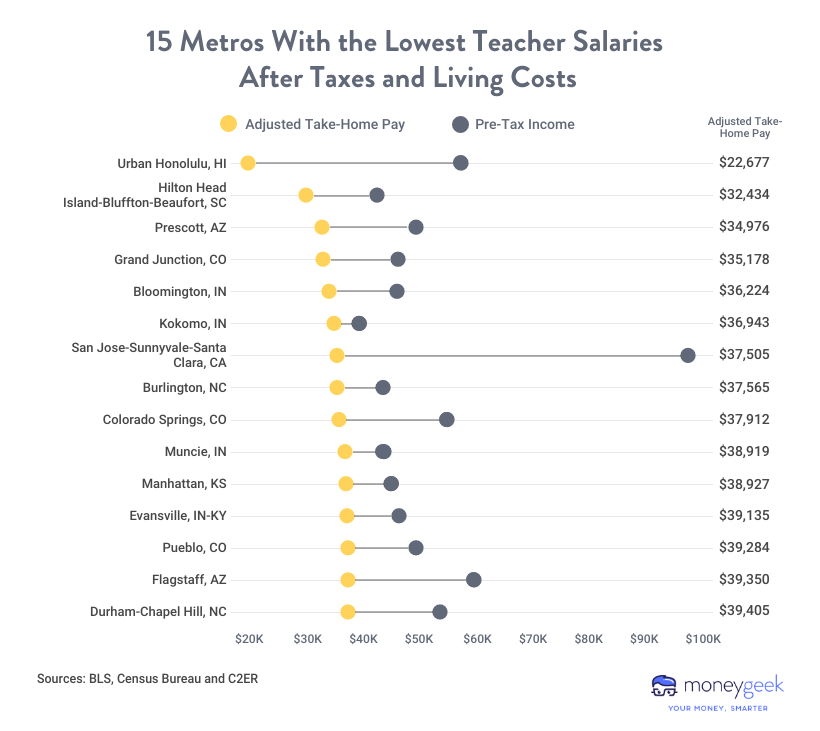
Where do teacher salaries stretch the furthest?
Where do teacher salaries stretch the furthest?
Teacher salaries are a hot-button issue, with the field experiencing well-documented wage gaps. According to an Economic Policy Institute report, teachers made 26.4% less than other similarly educated professions in 2022 — the lowest level since 1960. With taxes and basic living costs to consider, teacher salaries can go a long way or do the opposite, depending on where an educator lives.
MoneyGeek analyzed educator salaries in 178 metro areas to find the places where teachers make the most after taxes and living expenses. We also examined salaries for K-12 and postsecondary teachers to find the best metros for these educators. MoneyGeek learned that Southern metro areas offer the most significant stretch on earnings, especially for postsecondary educators. Additionally, after considering taxes and living costs, we found that postsecondary teachers make roughly $11,000 more annually than K-12 educators across the metros considered.
KEY FINDINGS
- McAllen, Texas, boasts the highest teacher salary purchasing power at $68,271, after accounting for 24% in taxes and living expenses 18% lower than the national average. Honolulu has the lowest educator salary at $22,677 after accounting for 29% in taxes and living costs 82% above the national average.
- Southern metros shine for teachers, with 21 ranking in the top third for salary competitiveness. Yet, Burlington, North Carolina, and Hilton Head Island-Bluffton-Beaufort, South Carolina, lag behind other metros in the South, ranking in the bottom 10 with earnings below $38,000 after adjustments.
- Although K-12 teachers earn 27% less than their postsecondary counterparts (under $60,000 compared to $82,134), that gap narrows to $11,000 after factoring in taxes and living costs.
- K-12 teachers seeking high returns should consider Kennewick-Richland, Washington, for $60,822 in adjusted take-home pay. Las Cruces, New Mexico, tops for postsecondary educators at $84,429 annually after taxes and living expenses.
- Despite a significant tax burden of 32% and living costs 20% above the national average, New York City secures the No. 13 highest adjusted take-home teacher salary at $57,781.

Teacher salaries stretch furthest in these southern metros
In McAllen, Texas, teachers' salaries go the furthest, with the average educator taking home $68,271 annually — a mere $5,000 less than pre-tax earnings. This metro is followed by Auburn, Alabama ($66,080), and El Paso, Texas ($65,260). Texas' lower cost of living and taxes propel half its metros into the top 10 with adjusted teacher earnings of $62,000 and higher.
In the Northeast, Hartford, Connecticut, just misses the top 10, landing at No. 11. There, teachers earn $57,976 after taxes and living expenses. Surprisingly, the New York-Newark-Jersey City metro, known for its high taxes and living costs, ranks No. 13. Despite these expenses, teachers in the Big Apple and surrounding areas keep $57,781 of their $101,068 pre-tax salary.

K-12 teacher salaries stretch most in Washington state metros
MoneyGeek also analyzed the metros for K-12 educators where teachers see the highest take-home pay. We found that less than one-third of the 178 U.S. metros studied surpass the average K-12 teacher gross pay of $59,817. Generally, K-12 teachers face a 23% reduction in income after accounting for taxes and living costs, but in certain areas, such as San Jose, California, the decrease can be as steep as 60%.
Western metropolitan areas — notably in Washington and New Mexico — offer K-12 teachers better financial prospects, reducing the toll of taxes and living expenses. Washington's Kennewick-Richland metro stands out as the only metro where K-12 teachers see an adjusted salary over $60,000. Yakima, Washington, is a close second, with an adjusted salary of $59,946.
A notable feature of metros at the top of the list is a lower-than-average cost of living. However, five metros with living costs above the national average still rank well (Mount Vernon, Bremerton and Olympia, Washington; Hartford, Connecticut; and the Providence-Warwick, Rhode Island-Massachusetts metro area).

Top metros for postsecondary teachers: Northeast flounders, Southwest dominates
On average, postsecondary teachers earn over $22,000 more annually than their K-12 counterparts, with an average gross salary of $82,134. The metros with the highest gross wages for postsecondary educators, San Francisco and New York-Newark-Jersey City, offer $115,314 and $109,897, respectively, but high living expenses and taxes reduce these by over $47,000 annually.
Las Cruces, New Mexico, with the third-highest postsecondary salary of $108,640, leads as the metro where postsecondary teacher salaries stretch the furthest, with the average educator taking home $84,429 annually after accounting for taxes and living costs. One other Southwestern metro, Las Vegas, joins the top of the list with the No. 6 highest take-home pay ($74,326). Select Southern and Midwestern metros also rank well, with postsecondary teachers retaining roughly $70,000 post taxes and living costs in these regions.

Metros where real income for teachers lags by thousands of dollars
Income for educators in the bottom-ranking 15 metros averages $36,429 after taxes and living costs, lagging by about $25,000 compared to the top areas. Honolulu fares worst, leaving teachers with just $22,677 after 30% taxes and living costs 82% above the national average. Similarly, Hilton Head, South Carolina, and Prescott, Arizona, see teachers earning less than $35,000 after taxes and living costs.
Among the worst 15 metros, San Jose, California, is striking: its pre-tax salary of $95,775 — the fourth-highest of any metro — dwindles to $37,505 after adjustment. Additionally, almost half of these worst-ranking metros boast lower-than-average living costs and taxes (i.e., more affordability), yet they still fall short due to their comparatively low pre-tax educator salaries.
Tips to stretch money further as an educator
Teachers play a pivotal role in shaping the future of our youth, yet they often face financial challenges beyond their control. With these tips below, educators can navigate these external financial hurdles and move toward a more secure financial future.
Explore homeownership assistance
If you're considering buying a home, look into teacher-specific financial resources and programs that offer substantial savings on closing costs and down payments, like the Educator Mortgage Program or Good Neighbor Next Door program. A mortgage calculator can offer a better understanding of your options.
Select credit cards wisely
Choose credit cards that offer benefits tailored for educators. Look for cards with low interest rates and get rewarded for your spending.
Leverage educator tax deductions
Take advantage of educator tax deductions when filing taxes. Remember, you can claim up to $250 for classroom supplies and possibly more if you've been pursuing further education.
Maximize salary opportunities
Consider advancing your education or exploring extra earning opportunities, like summer school, coaching or tutoring. This enhances your skill set and can lead to step raises and additional income.
Educator car insurance discounts
Many car insurance providers offer discounts to teachers. Always inform your insurance agent of your profession and compare quotes to ensure you get the best and cheapest car insurance tailored for educators.
Methodology
To assess the impact of taxes and living expenses on teacher salaries nationwide, MoneyGeek analyzed Bureau of Labor Statistics' Occupational Employment and Wage Statistics (OEWS) data for 178 U.S. metro areas. For our Overall ranking, MoneyGeek factored in a broad range of educator salaries, including K-12, postsecondary, preschool, substitute and self-enrichment teachers. For our breakdowns of the best metros for K-12 and Postsecondary educators, we only considered salaries for those specialties.
We calculated net salaries by applying federal, state and local taxes using SmartAsset's paycheck calculator and then adjusted for local living costs using data from the Council for Community and Economic Research.
For example, in the New York City metro area, the post-tax salary for teachers averages $69,280. With living costs 20% above the national average, the actual purchasing power equates to $57,781 when adjusted for these expenses.
This story was produced by Moneygeek and reviewed and distributed by Stacker Media.



